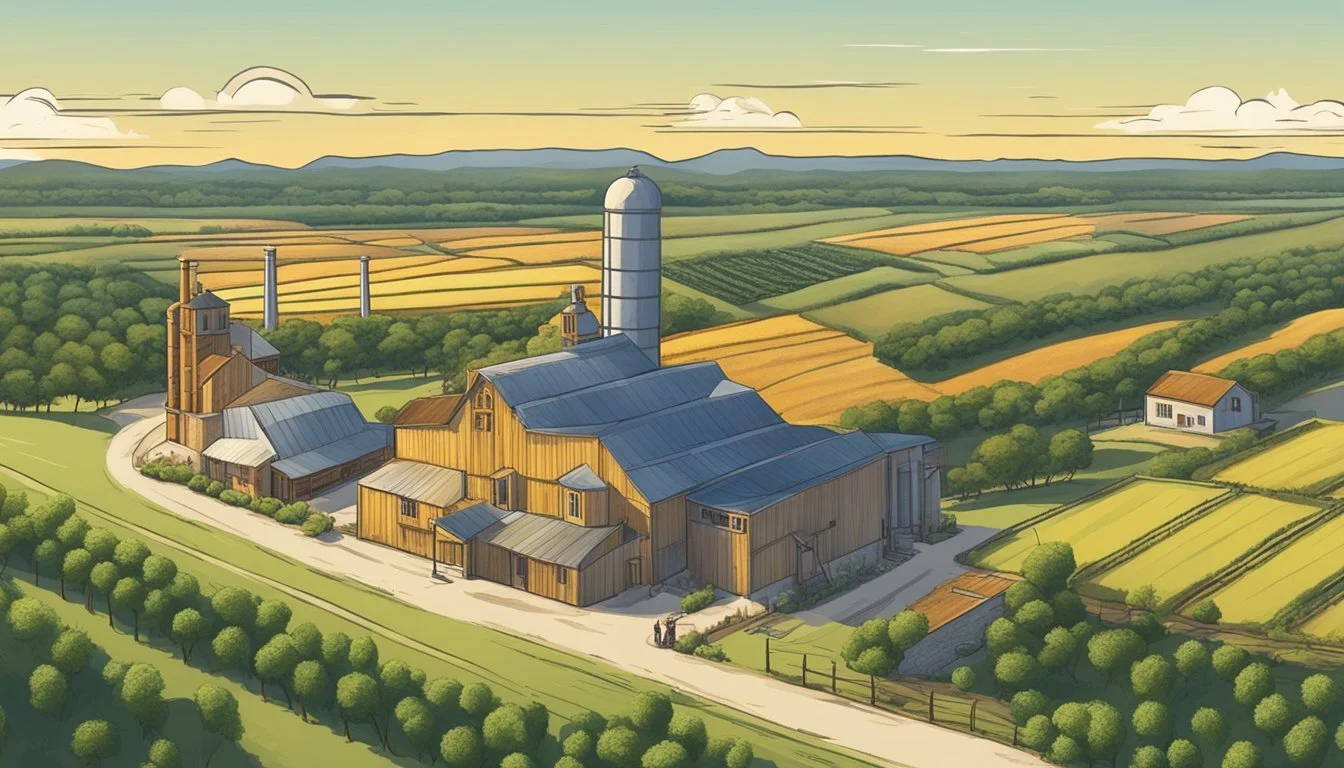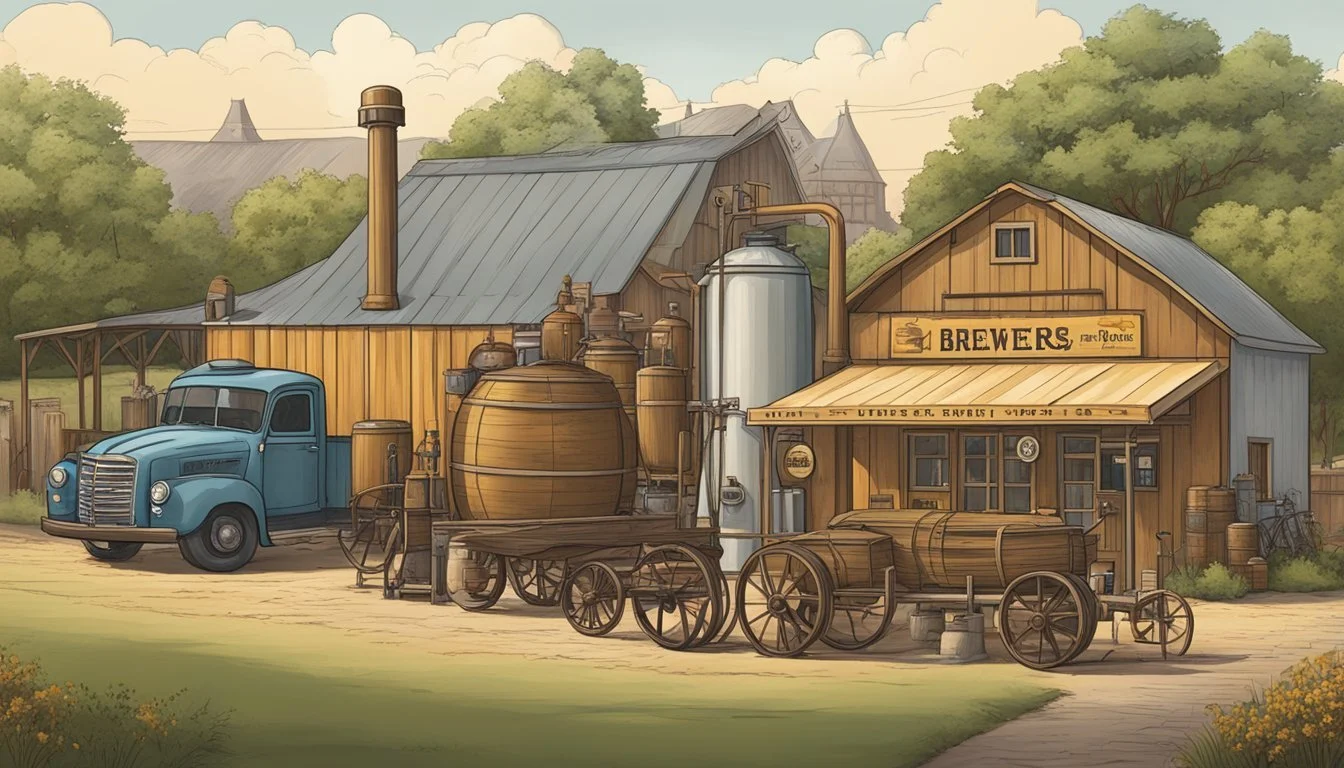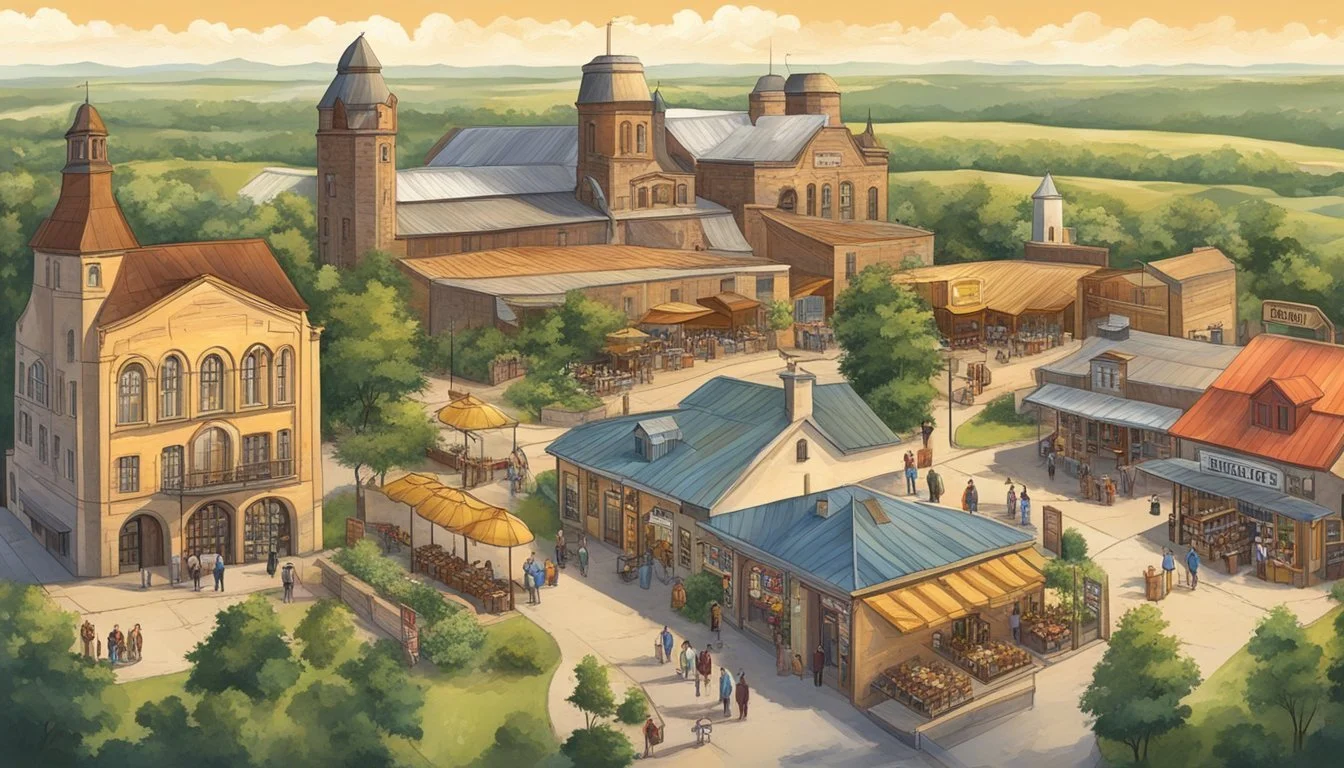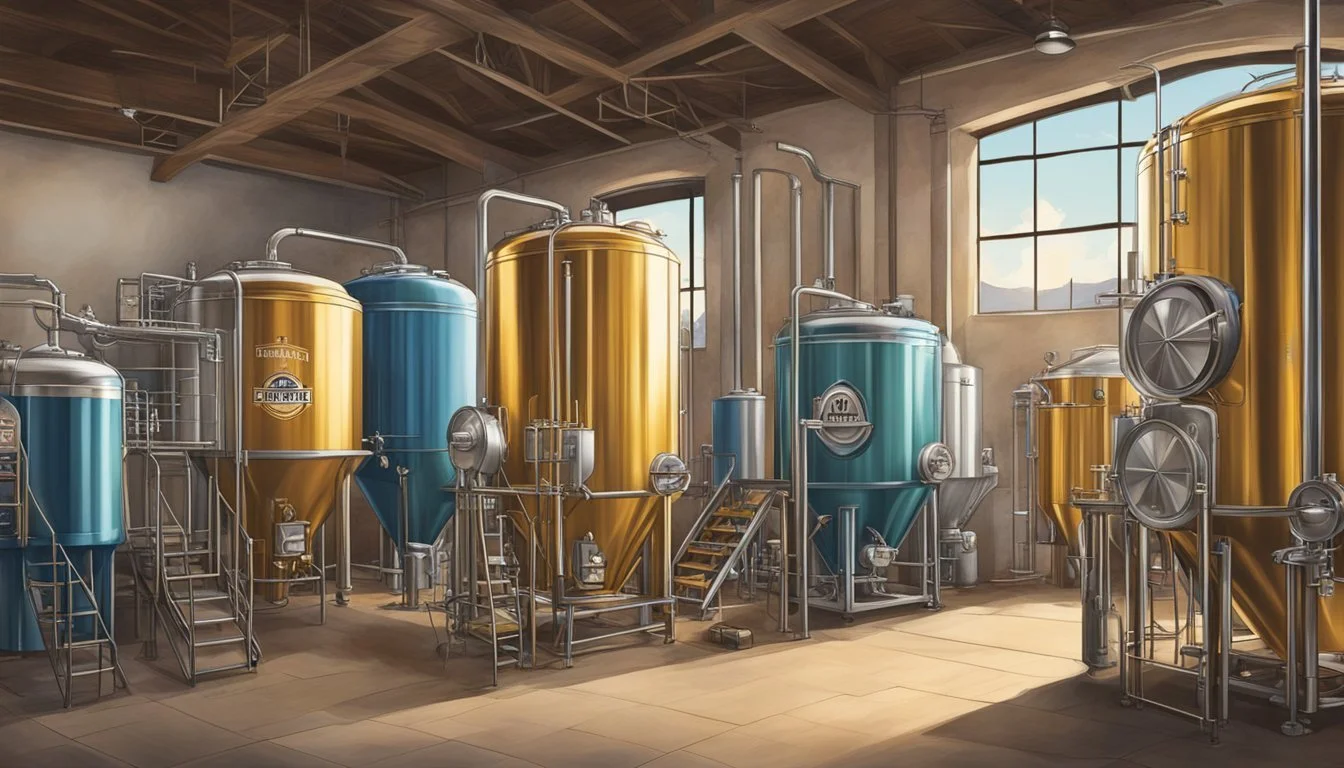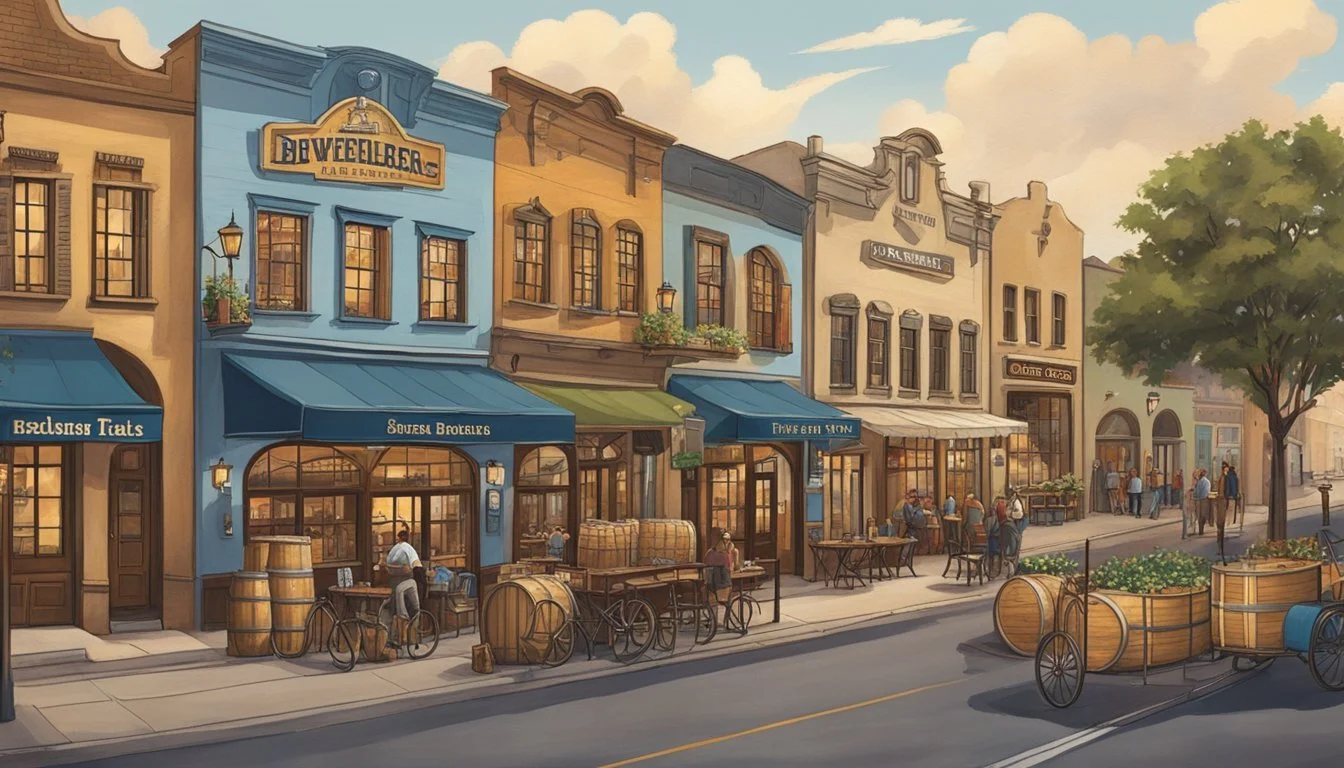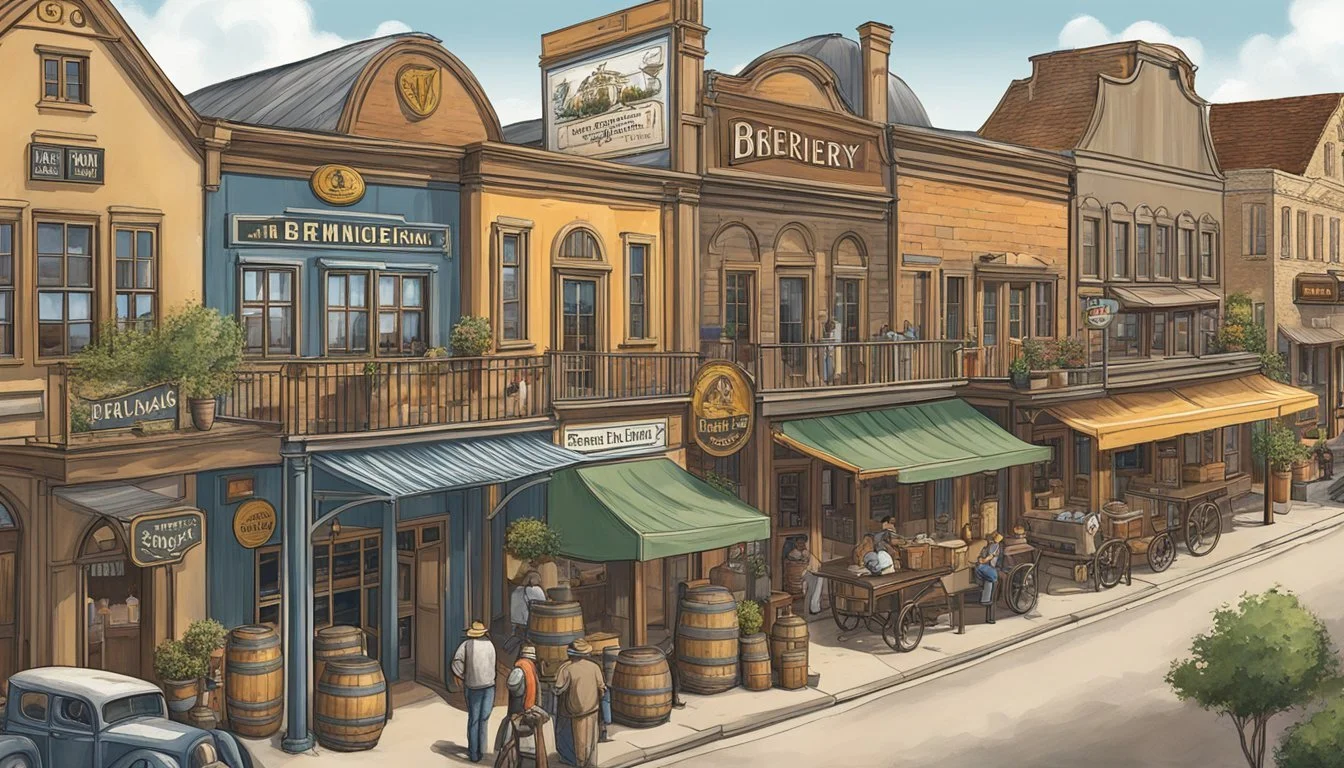The History of German Texan Breweries
Shaping the Lone Star State's Beer Legacy
The history of Texas breweries is deeply entwined with the state's German and Czech heritage. In the mid-19th century, German and Czech immigrants began settling in Central Texas, bringing with them traditional brewing techniques and a deep appreciation for beer. This cultural influx laid the foundation for a distinctive beer culture within the state. These settlers established local breweries, adapting their European brewing practices to the unique climate and resources of Texas.
One notable example of German influence on Texan brewing is the Shiner Brewing Association, established in 1909 by German and Czech residents with Prussian-born Herman Weiss as the first brewmaster. The Shiner Bock, initially crafted during this period, has become a signature beer of Texas. As the brewing industry thrived, so did the Texan taste for lagers, ales, and other styles that were previously unfamiliar to the region.
Over time, these breweries transformed from small operations to larger enterprises, reflecting the growing beer industry in Texas. Despite the challenges presented throughout history, including Prohibition, these German Texan breweries have continued to impact Texas beer culture. They play a crucial role in the state's economic and cultural narrative, showcasing the rich heritage of the immigrant communities and their lasting legacy on brewing traditions.
Origins of German Texan Breweries
This section explores the early development of breweries by German and Czech settlers in Texas and their significant role in shaping the state's beer culture.
Early Settlements and Brewing Beginnings
In the mid-19th century, Texas saw a significant influx of European settlers, particularly Germans, attracted by the promise of land and opportunity. German immigrants, drawn to the vast landscapes of Central Texas, brought with them the traditions and skills of beer brewing from their homeland. Brewing began as home-based operations, with the first breweries in Texas being small and local. These German settlers laid the foundation for what would become a rich brewing tradition in the area.
Influence of German and Czech Immigrants
The German and Czech immigrants carried their rich heritage of beer-making to Texas, profoundly influencing the local culture. By 1909, the oldest independent brewery in Texas, the Shiner Brewing Association, was formed by a community of these settlers. The brewery, now famous for its Shiner Bock, was initially managed by Prussian-born Herman Weiss, and later taken over by Bavarian native Kosmos Spoetzl. The presence of Europeans, especially those from Bavaria and other German regions, catalyzed a beer revolution that left a lasting mark on Texas' beer identity.
Development of Texas Beer Culture
The Texas beer culture is deeply influenced by German Texan breweries, evolving through pivotal historical periods including the Lager Beer Revolution, the dry years of Prohibition, and the subsequent Post-Prohibition resurgence that shaped the modern landscape.
Lager Beer Revolution
The German and Czech settlers contributed greatly to the brewing landscape of Texas, emphasizing lager techniques. The late 19th and early 20th centuries saw these groups carve out a niche, with the Shiner Brewing Association, established in 1909, being a significant player. Their Shiner Bock became a signature, signaling a shift towards lager-style beers and setting the stage for a rich beer history.
Prohibition and Its Effects
The enactment of Prohibition in the 1920s dealt a severe blow to Texas breweries, many of which were forced to either shut down or pivot their production to soft drinks or near beers. The temperance movement temporarily erased many of the advancements and beer styles developed by the German and Czech brewers, pushing ale and beer production underground.
Post-Prohibition Resurgence
Following the repeal of Prohibition, the Texas beer culture slowly began to regain its momentum. It wasn't until the late 20th century that a resurgence in interest for craft ales and traditional brews took hold. This period marked the comeback of small-scale breweries and the diversification of beer styles, reestablishing the state as a hub for beer enthusiasts and reflecting the historical significance of beer as a cultural drink in Texas.
Notable Breweries and Their Legacy
This section explores the influential breweries of Texas and their profound impact on the state's beer culture, from the established legacies to the burgeoning craft beer scene.
Established Texas Breweries
Texas' brewing history is robust, with several key players laying the foundation for today's thriving beer culture. Spoetzl Brewery in Shiner, known for the iconic Shiner Beer, has been a Texas staple since 1909. The brewery originated when German and Czech immigrants combined their brewing traditions to create beers that would become Texas classics. Likewise, the Pearl Brewery in San Antonio, operational from the 1880s until 2001, was another major force in the Texan brewing landscape.
Another significant name is the Lone Star Brewery, also based in San Antonio. Established in the late 19th century, Lone Star has been dubbed the "National Beer of Texas," despite changes in ownership and operations over the years.
The Rise of Craft Breweries
The Texas craft beer movement has seen extraordinary growth, in part championed by associations like the Texas Craft Brewers Guild. Central Texas has become a particularly vibrant hub for craft beer innovation.
Saint Arnold Brewing in Houston, which opened in 1994, is considered Texas's oldest craft brewery. Their diverse lineup of beers showcases both traditional and inventive styles.
Live Oak Brewing in Austin, founded in 1997, specializes in old-world style beers, highlighting the German influence with their well-received hefeweizen.
From a small operation to one of the largest in Texas, Real Ale Brewing is located in Blanco and has been part of the craft beer surge since 1996.
These craft breweries, with their focus on local, high-quality ingredients and small-batch production, have redefined the beer culture, fostering a community of beer aficionados and casual enjoyers alike.
Impact on Local Economy and Tourism
German Texan breweries have become cornerstones of both local economies and the broader Texas tourism industry. They serve as hubs for cultural events and provide substantial employment opportunities in their communities.
Brewery Tours and Cultural Events
Texas has seen a surge in brewery tours and cultural events related to its German heritage. Significant attractions include Oktoberfest celebrations, which draw visitors keen to experience a taste of Germany's famous beer culture in towns like Fredericksburg and New Braunfels. These festivals, often sponsored or directly organized by local breweries, not only celebrate German-Texan history but also bring substantial revenue from tourism. The Texas State Historical Association notes the deep-rooted influence of such events on Texan culture, underpinning the economic boost they provide.
Brewery Contributions to Employment
Local breweries are often among the largest employers in small Texas towns. They are not just places for brewing beer; these establishments are often accompanied by restaurants, biergartens, and entertainment venues. This multifaceted approach to business translates into diverse job opportunities for Texans. As the breweries grow, they fuel job creation and support for ancillary services like transportation, hospitality, and merchandise, all of which are vital for economic stability and growth in the region.
Community and Cultural Contributions
German Texan breweries have served both as social hubs within Texas communities and preservers of the rich German and Czech heritage. Their influence permeates through beer culture, traditions, culinary arts, and music, encapsulating the essence of these European cultures in local Texan life.
Breweries in Texas Communities
German and Czech settlers brought with them not only their thirst for beer but also substantial brewing knowledge, leading to the establishment of numerous breweries across Texas. These breweries became focal points for community interaction and social gatherings. In towns such as Fredericksburg and New Braunfels, breweries act as landmarks where locals and visitors alike can enjoy traditional beers indicative of their heritage. The presence of these breweries contributes to the economic vitality and social fabric of these regions.
Community Impact:
Social hubs for locals and tourists
Economic contributors to small Texas towns
Platforms for cultural exchange and interaction
The Role in Preserving Heritage
The breweries of German Texan communities uphold brewing traditions that have been passed down through generations. They play a crucial role in preserving and celebrating German and Czech culture within Texas. Traditional events like Oktoberfest and Maifest serve as a confluence of beer, music, food, and dance, which helps maintain the identity and continuity of these cultural heritages.
Cultural Preservation:
Brewing Traditions: They closely follow time-honored recipes and brewing techniques.
Music and Dance: Events often feature polka music and traditional dances, cementing their role in cultural conservation.
German Cuisine (What Wine Pairs Perfectly With German Cuisine): These breweries often also serve food, offering dishes like sausages, schnitzels, and strudels, key components of German culinary traditions.
Modern Brewing Innovations and Trends
The history of German Texan breweries has evolved, showcasing a blend of tradition with modern brewing innovations, which has significantly influenced the Texas beer culture. Two major areas of development are advancements in brewing technology and the thriving craft beer movement, which have both shaped contemporary beer production and consumption.
Advancements in Brewing Technology
In recent years, Texas breweries have integrated state-of-the-art brewing technology to enhance production efficiency and beer quality. Automated brewing systems have allowed for more precise control of key brewing parameters, such as temperature and pH levels, resulting in consistent and high-quality batches. Microfiltration technology has also improved, ensuring clarity and stability in the final product without altering flavor profiles.
Houston's forward-thinking establishments, like Saint Arnold Brewing Company, have leveraged these technologies to not only maintain the integrity of traditional German brews but also to innovate within the space. Similarly, in Austin, breweries such as Austin Beer Garden Brewing Co. (ABGB) have established themselves as leaders in adopting modern methods, consistently winning awards for their finely crafted beer.
The Craft Beer Movement
The craft beer movement, characterized by its artisanal approach and emphasis on flavor, originality, and quality, has seen significant traction in Texas. Craft breweries often draw from the rich German Texan brewing heritage while introducing diverse styles and experimental brews.
In Austin and West Texas, breweries like Pinthouse Pizza have gained recognition for their unique craft beer offerings that have broadened the beer consumption palette. These breweries form part of a larger trend across the state, where there is a clear appetite for craft beer and a respect for the history of beer within the community.
Brewpubs and taprooms are central to the movement, serving as both social hubs and educational venues where the community can learn about beer and its historical roots. Through these venues and the efforts of the craft beer community, German Texan breweries have not only preserved their legacy but also secured their place in a modern landscape that values both innovation and tradition.
Recognition and Achievements
German Texan breweries have consistently garnered attention and acclaim for their excellence in beer crafting, solidifying their position in both local and global beer cultures through a series of noteworthy accomplishments.
Awards and Recognition at Festivals
At numerous beer festivals, German Texan breweries have clinched numerous medals for their quality beers. Among the notable awards, the Great American Beer Festival (GABF) has been a platform where Texan breweries, influenced by German brewing traditions, have shined. Their renditions of various beer styles have outperformed competitors, notably in categories such as the American Light Lager.
Medal Wins at GABF: The precision and skill of German Texan breweries in perfecting beer styles are evident through their medal tally at the GABF. They have secured gold, silver, and bronze medals, elevating the status of Texas craft beer on a prestigious national stage.
Global Influence of Texas Craft Beer
The influence of Texas craft beer has extended well beyond state and national borders. German Texan breweries have not only contributed to the diversity of the American beer scene but have also impacted beer cultures around the world.
International Recognition: Texas craft beers, rooted in German heritage, have gained recognition at international beer competitions, showcasing the global relevance of their brewing techniques and flavor profiles.
Export to Global Markets: These breweries have seen their beers exported to various countries, introducing the unique blend of German tradition and Texan innovation to beer enthusiasts worldwide.
Regulation and Legislation
Texas beer culture and its breweries have been substantially shaped by the state's regulatory framework. This section discusses the evolution of alcohol laws, their impact on the industry, and the actions of advocacy groups like the Texas Craft Brewers Guild in shaping legislation.
Alcohol Laws and Industry Regulation
Texas has a complex set of alcohol laws that govern the production, distribution, and sale of beer. Legislative History reveals that Texas breweries had to navigate through a layered regulatory landscape that often tied the hands of small brewers. For instance, before legislative changes, breweries could only self-distribute their beer if they sold fewer than 75,000 barrels (bbls) per year. Recent laws have adjusted this cap, allowing breweries selling up to 125,000 bbls a year to self-distribute 40,000 bbls of their sales. This change has been crucial in supporting smaller breweries' growth and their ability to reach consumers directly.
Changes in legislation reflect a recognition of personal liberty in beer production and consumption, as well as a respect for the traditions brought by German and Czech immigrants. These regulatory evolutions have allowed for a broader promotion of the beer industry as a whole in Texas.
Advocacy for Texan Beer
The Texas Craft Brewers Guild has been at the forefront of advocating for regulatory reforms that benefit the state's vibrant beer industry. They have been instrumental in driving legislative change, often by highlighting how relaxed regulations can spur economic growth, provide jobs, and lead to a wider variety of beer for consumers.
Their advocacy efforts include ensuring fair competition and market access for all breweries, regardless of size. The Guild's push for legislative progression underscores how collaboration within the industry can lead to beneficial results for both brewers and beer enthusiasts, aligning with the values of personal liberty and fair business practice.
Historical Landmarks and Preservation
This section explores the physical remnants of the German Texan brewery legacy and the educational efforts taken to preserve and share their beer history.
Historic Brewery Buildings
Western Brewery, the first brewery in Texas, remains a significant historical landmark. Established by William Menger in 1855 adjacent to his Menger Hotel near the Alamo in San Antonio, it represents the cornerstone of Texas brewing history. The Texas Historical Commission recognizes this area as a rich part of the state's heritage. Although the brewery no longer operates, the Menger Hotel still stands as a testament to this legacy.
Another key site, the Kreische Brewery, was founded by Heinrich Kreische in the 1860s in La Grange, Texas. Kreische was one of the earliest German brewers in Texas, and his homestead and brewery ruins are now preserved as part of the Monument Hill and Kreische Brewery State Historic Sites. Visitors can explore the stone remains that overlook the Colorado River, which once housed vibrant brewing activity.
Educational Resources on Beer History
The Texas Historical Commission provides insightful resources that promote the history and impact of German Texan breweries. Their educational materials include:
Mobile Tours: Featuring interactive maps, images, and visitor information to guide individuals through historic sites.
Visitor Information: Detailed descriptions and historical context for important landmarks such as the Menger Hotel and Kreische Brewery.
By offering these resources, the commission ensures that the story of German Texan brewing and its impact on the state's beer culture remains accessible and well-preserved for future generations.
Future of the Texas Beer Scene
As the Texas beer scene continues to evolve, two key factors will shape its trajectory: innovative brewing trends and a commitment to sustainability. These elements promise to influence not only the flavor profiles that emerge from the Lone Star State but also how breweries impact the region environmentally and economically.
Emerging Trends in Texas Beer
Brewers in Texas are at the forefront of experimentation, using local ingredients to create unique and thoughtful beers that reflect the state's diverse cultural heritage. One can expect to see a continuous rise in small-batch releases and seasonal offerings, which allow brewers to offer new flavors while gauging consumer preferences. As craft beer consumers become more knowledgeable, the demand for barrel-aged beers and wild fermentations is likely to grow—further propelling Texas to the forefront of the craft beer revolution.
Local Ingredients: Brewers are increasingly turning to Texas-grown hops, malt, and adjuncts like peaches or pecans, to provide a terroir-specific taste.
Collaborations: Collaborative brews between local breweries or with out-of-state partners are fueling innovation and drawing new consumers to the craft beer fold.
Sustainability and Environmental Concerns
Sustainability efforts are expanding in the Texas beer industry, aligning with global concerns about climate change and resource management. Water reclamation, energy-efficient brewing equipment, and waste reduction programs are examples of how Texas breweries are protecting their state's natural resources. The use of renewables, like solar and wind power, is becoming more commonplace, and there is a rising trend of zero-waste breweries that aim to reduce their ecological footprint.
Sustainability Practices:
Renewable Energy: Many breweries are installing solar panels and wind turbines.
Water Conservation: New water-saving brewing techniques and water reclamation systems are being implemented.
Packaging: Biodegradable packaging materials and recycling programs are reducing waste.
The future of the Texas beer scene is one where tradition meets innovation, and environmental responsibility becomes as important as the quality of the brews. As beer consumption in Texas evolves, these emerging trends and sustainability efforts are poised to ensure the Lone Star State's beer culture remains vibrant and relevant.
Conclusion
The legacy of German and Czech immigrants in Texas is fundamental to the state's beer culture today. The breweries established by these settlers marked the early landscape of beer production in Texas, centered predominantly in Central Texas. The influence of German Texan breweries has been instrumental in shaping not only the varieties of beer available but also the culture surrounding beer consumption in the state.
Craft Beer Revolution: In recent years, Texas has seen a craft beer revolution, building upon the foundations laid by early European immigrants. With over 300 craft breweries now operating across the state, Texas has become a significant player in the American craft beer industry.
Economic Impact: The proliferation of breweries has had a considerable economic impact. They have contributed to job creation, tourism, and local economies, fostering a sense of community and pride amongst residents.
Traditional Influences: The techniques and flavors introduced by German and Czech brewers have been preserved and adapted, with a commitment to quality and craftsmanship remaining at the heart of Texan brewing.
Community and Culture: Breweries often serve as communal hubs, reflecting the state’s diversity and the unifying nature of beer across cultures.
Preservation: Efforts to maintain historical breweries and celebrate the state's brewing heritage speak to the value placed on this aspect of Texas history.
The journey from early immigrant home breweries to today's craft beer scene tells a story of adaptation, resilience, and growth, illustrating the importance of this heritage in modern Texas.

